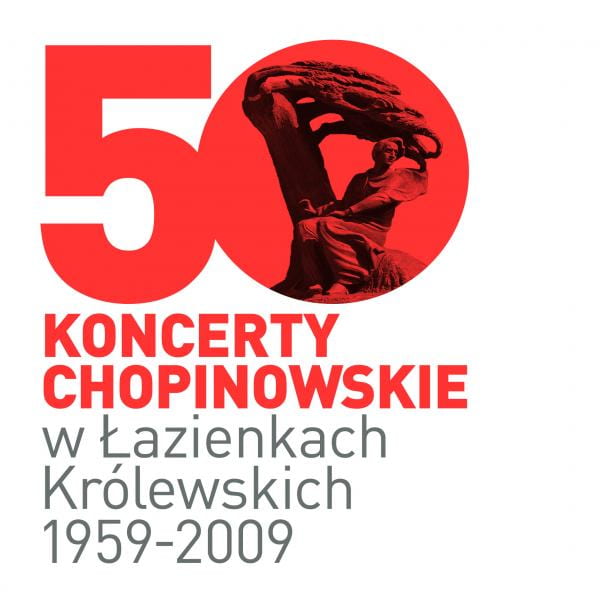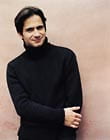Polish Music Reference Center Newsletter Vol. 15, no. 6
PMC News
Recent Donations
The Adam Mickiewicz Institute has donated four copies of their album about Henryk Mikołaj Górecki. This English-language publication was prepared by the Institute for Górecki’s 75th birthday celebrations in 2008. This beautifully edited and illustrated book is directed primarily at readers from abroad. It bridges an important gap in the Górecki bibliographies available worldwide.
 Edited by Barbara Zwolska-Stęszewska, it contains the composer’s biography written by Anna Iwanicka-Nijakowska, an in-depth essay about Górecki’s body of works by the distinguished musicologist Krzysztof Droba, an essay by Jakub Banaś about the links between the composer’s music and film, and two interviews with Górecki conducted in 2002 and 2008 by Małgorzata and Marcin Gmys. The book also includes brief personal impressions on Górecki from Adrian Thomas, Eugeniusz Knapik, Louise Lerche-Lerchenborg, Jerzy Maksymiuk, Rafał Augustyn, David Harrington, Wojciech Michniewski, Elżbieta Chojnacka, Antoni Wit, Bohdan Pociej and Grzegorz Michalski. The publication is complemented by numerous photographs and a complete list of the composer’s works, with a detailed discography.
Edited by Barbara Zwolska-Stęszewska, it contains the composer’s biography written by Anna Iwanicka-Nijakowska, an in-depth essay about Górecki’s body of works by the distinguished musicologist Krzysztof Droba, an essay by Jakub Banaś about the links between the composer’s music and film, and two interviews with Górecki conducted in 2002 and 2008 by Małgorzata and Marcin Gmys. The book also includes brief personal impressions on Górecki from Adrian Thomas, Eugeniusz Knapik, Louise Lerche-Lerchenborg, Jerzy Maksymiuk, Rafał Augustyn, David Harrington, Wojciech Michniewski, Elżbieta Chojnacka, Antoni Wit, Bohdan Pociej and Grzegorz Michalski. The publication is complemented by numerous photographs and a complete list of the composer’s works, with a detailed discography.
 Also, the Kosciuszko Foundation in Warsaw and its representative, Joseph A. Herter, sent the PMC a copy of the complete program from this year’s 23rd edition of the Warsaw Musical Meetings. Organized by the Warsaw chapter of Polish Composer’s Union [ZKP], this annual music festival has a very broad program, including ancient music to contemporary works. The extensive program notes for the festival provide a wealth of information on composers and performers as well as historical background.
Also, the Kosciuszko Foundation in Warsaw and its representative, Joseph A. Herter, sent the PMC a copy of the complete program from this year’s 23rd edition of the Warsaw Musical Meetings. Organized by the Warsaw chapter of Polish Composer’s Union [ZKP], this annual music festival has a very broad program, including ancient music to contemporary works. The extensive program notes for the festival provide a wealth of information on composers and performers as well as historical background.
PMC in SF
 Items from the Polish Music Center collection were displayed in San Francisco last month, in an exhibit about Stanisław Moniuszko, who is known as the “Father of Polish Opera.” This exhibit was held in conjunction with San Francisco Pocket Opera’s production of Moniuszko’s Straszny Dwór [The Haunted Manor]. The exhibit was curated by Caria Tomczykowska of the Polish Arts and Culture Foundation (PACF), from which some of the materials that were used in the exhibit had been originally donated to the PMC years ago. The PACF, along with Łowiczanie Polish Folk Ensemble, also loaned some of the costumes and props for the Pocket Opera production.
Items from the Polish Music Center collection were displayed in San Francisco last month, in an exhibit about Stanisław Moniuszko, who is known as the “Father of Polish Opera.” This exhibit was held in conjunction with San Francisco Pocket Opera’s production of Moniuszko’s Straszny Dwór [The Haunted Manor]. The exhibit was curated by Caria Tomczykowska of the Polish Arts and Culture Foundation (PACF), from which some of the materials that were used in the exhibit had been originally donated to the PMC years ago. The PACF, along with Łowiczanie Polish Folk Ensemble, also loaned some of the costumes and props for the Pocket Opera production.
Chopin Year 2010
Plans For Chopin Anniversary Begin To Form
IN POLAND
 The Polish Sejm [Parliament] has declared 2010 the “Year of Chopin,” in honor of the 200th anniversary of the birth of one of Poland’s most beloved sons, whose music is considered an embodiment of the Polish spirit —pianist and composer Frederic [Fryderyk] Chopin (1810-1849). Organizations and institutions throughout Poland are abuzz with plans for concerts, conferences, exhibitions, and celebrations of all kinds—and the Fryderyk Chopin Institute and CHOPIN2010 Celebrations Committee (Waldemar Dąbrowski – Chairman) is at the center of that excitement.
The Polish Sejm [Parliament] has declared 2010 the “Year of Chopin,” in honor of the 200th anniversary of the birth of one of Poland’s most beloved sons, whose music is considered an embodiment of the Polish spirit —pianist and composer Frederic [Fryderyk] Chopin (1810-1849). Organizations and institutions throughout Poland are abuzz with plans for concerts, conferences, exhibitions, and celebrations of all kinds—and the Fryderyk Chopin Institute and CHOPIN2010 Celebrations Committee (Waldemar Dąbrowski – Chairman) is at the center of that excitement.
Here are a few of the events that will be taking place in Poland in 2010, as organized by the Fryderyk Chopin Institute:
- MUSEUM UPGRADE: The Fryderyk Chopin Museum in Warsaw is currently closed for extensive renovations, to be opened for the Chopin Year in a completely new form
- THE BIRTHDAY DECADE: The first of the three dominating events of the Chopin Year will be a series of concerts between 21 February and 1 March 2010 (encompassing the two hypothetical dates of the composer’s birth). Performances by Martha Argerich, Piotr Anderszewski, Leif Ove Andsnes, Rafał Blechacz (who will open the birthday celebrations), Daniel Barenboim, Dang Thai Son, Evgeny Kissin, Garrick Ohlsson, Janusz Olejniczak, Murray Perahia, Ivo Pogorelich and Yundi Li. The artists will be accompanied by Frans Brüggen’s Orchestra of the Eighteenth Century and the Warsaw Philharmonic Orchestra conducted by Antoni Wit.
- 3RD INT’L CHOPIN CONGRESS: This conference will be held from 25 February to 1 March 2010, with the theme of “Ideas – Interpretations – Influence.” The period for accepting proposals of conference presentation is closed.
- CHOPIN AND HIS EUROPE: The special edition of the 2010 Festival will last for all of August and encompass 50 music events with the participation of over 1,000 performers from all over the world. Events will include recitals, classical and jazz concerts, open-air performances and more.
- FRYDERYK CHOPIN COMPETITION: The 16th International Fryderyk Chopin Piano Competition will be held from October 2 – 23, 2010.
For more information and to keep up to date on celebration events, please visit chopin2010.pl. For an interesting and informative article fron the International Herald Tribune about today’s continuing links to the great composer, visit: www.poland.travel.
IN LOS ANGELES
 The 2010 spring concert of the Polish Music Center will be devoted to the music of Chopin on the 200th anniversary of his birth. Echoing the Thornton School of Music’s beloved annual Chamber Music Marathon, the PMC will present a Chopin Marathon. Students and faculty from USC as well as performers from throughout Southern California will come together in a half-day celebration of Chopin’s beautiful romanticism and demanding technique. In line with the contents of Chopin’s œuvre, most of the performances will be of works for solo piano, although some of the rare chamber works will be presented as well. Join us on March 27, 2010 in Newman Recital Hall on the USC campus for an afternoon of delightful music and celebration. Please call (213) 821-1356 or email polmusic@thornton.usc.edu if you have any questions.
The 2010 spring concert of the Polish Music Center will be devoted to the music of Chopin on the 200th anniversary of his birth. Echoing the Thornton School of Music’s beloved annual Chamber Music Marathon, the PMC will present a Chopin Marathon. Students and faculty from USC as well as performers from throughout Southern California will come together in a half-day celebration of Chopin’s beautiful romanticism and demanding technique. In line with the contents of Chopin’s œuvre, most of the performances will be of works for solo piano, although some of the rare chamber works will be presented as well. Join us on March 27, 2010 in Newman Recital Hall on the USC campus for an afternoon of delightful music and celebration. Please call (213) 821-1356 or email polmusic@thornton.usc.edu if you have any questions.
IN SAN DIEGO

On January 15, 2010, San Diego will kick off a year-long “Chopin Bicentennial Celebration” with a performance by Garrick Ohlsson, the first American pianist to win the Chopin Competition in Warsaw in 1970 who considers Chopin to be “a dictionary of the total possibilities of the piano and the human hand together” (see reference below). This celebration of the 200th anniversary of the birth of Frederic Chopin will encompass the complete œuvre of Chopin’s works, performed over the course of 12 concerts in 5 different venues. Several groups are involved to create and support these programs, including the: La Jolla Music Society, San Diego Symphony, California Ballet, and San Diego Youth Symphony.
Journalist Jim Chute wrote about the events of and history behind the Chopin Bicentennial Celebration in his article “The Genius of Chopin” on May 10 in the San Diego Union-Tribune:
“People may say that Bach was the greatest composer of all time, or they might argue and say Mozart was, but there’s no argument that Chopin was the master of the piano” [Christopher] Beach[, artistic director of the La Jolla Music Society,] said. “And since the piano is the greatest instrument we have, other than the human voice, he deserves a big anniversary.”
Even if it were not Chopin’s anniversary, it’s hard to imagine a better time for a full shot of the 19th-century Polish composer’s transformative music. In an era of economic, social and political upheaval, you can find solace in Chopin’s rare combination of the most sublime elegance and over-the-top, almost unhinged passion.
“He’s such a perfect synthesis,” Ohlsson said. “He’s right at the cusp of classicism and romanticism, although he thought of himself much more as a classicist. The gods for him were Bach and Mozart, although he knew lots of other music and admired Beethoven. But Beethoven certainly wasn’t his guy.”
Neither Ohlsson nor Beach is aware of a festival of equal scope – surveying the entire range of Chopin’s music – anywhere in the United States.
Watch the La Jolla Music Society website for continuing updates on the events of the Chopin Bicentennial Celebration in San Diego.
[Sources: www3.signonsandiego.com, www.tunepiano.com]
IN CHICAGO
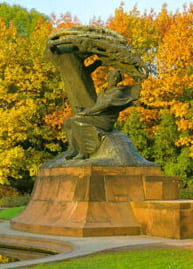 In honor of Chopin’s contribution to music “We The People of Chicago” want to bring Chopin to Our City and to erect a copy of the famous Art Nouveau Chopin Monument in Warsaw’s Royal Baths Park here downtown in Chicago.
In honor of Chopin’s contribution to music “We The People of Chicago” want to bring Chopin to Our City and to erect a copy of the famous Art Nouveau Chopin Monument in Warsaw’s Royal Baths Park here downtown in Chicago.
The Chopin Monument was designed by Wacław Szymanowski, a prolific artist known for his emotionally charged art. Like most of his work, it is composed in the Art Nouveau style. The design is symbolic with the prominent stylized weeping willow over Chopin’s seated figure meant to echo the pianist’s hand and fingers.
Chicago is truly a global city of Arts and Culture, and is rightfully assuming its position as a global city on the world’s stage. Frank Lloyd Wright famously said, “Eventually, I think Chicago will be the most beautiful great city left in the world.” It would be a shame that one of Poland’s proudest sons does not have a monument dedicated to him in the city that prides itself as having the largest population of Poles outside of Poland. [quoted from www.chopinmonumentinchicago.com]
Sinfonia Varsovia Recording
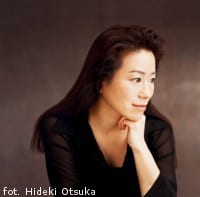 The Sinfonia Varsovia orchestra, with conductor Jacek Kaspszyk, has just finished recording a new CD for Sony Music Japan and it is scheduled for release in Japan in January 2010. The album features Japanese pianist Michie Koyama, a laureate of the XI Chopin Competition in Warsaw and Tchaikovsky Competition in 1982 playing two piano concertos by Frederic Chopin. When it is released, it will be one of the first new releases to celebrate the anniversary year of Frederic Chopin.
The Sinfonia Varsovia orchestra, with conductor Jacek Kaspszyk, has just finished recording a new CD for Sony Music Japan and it is scheduled for release in Japan in January 2010. The album features Japanese pianist Michie Koyama, a laureate of the XI Chopin Competition in Warsaw and Tchaikovsky Competition in 1982 playing two piano concertos by Frederic Chopin. When it is released, it will be one of the first new releases to celebrate the anniversary year of Frederic Chopin.
[Source: muzyka.onet.pl]
Jonathan Plowright Recording
 British pianist Jonathan Plowright, champion of Polish romantic music for the piano and 2006 Paderewski Lecture performer, is currently working on a CD for Hyperion Records to be released in early 2010 to commemorate the anniversary. It will feature pieces written in the style of and/or in homage to Chopin.
British pianist Jonathan Plowright, champion of Polish romantic music for the piano and 2006 Paderewski Lecture performer, is currently working on a CD for Hyperion Records to be released in early 2010 to commemorate the anniversary. It will feature pieces written in the style of and/or in homage to Chopin.
The repertoire of the disc will include: BALAKIREV – Impromptu for piano (after Chopin’s Preludes in E flat minor and B major), BENDEL – Hommage à Chopin, Opus 111 No.1; BERKELEY – 3 Mazurkas, “Hommage à Chopin”; BUSONI – Variations on a theme by Chopin; GODARD – Lanterne Magique (Chopin, Opus 66 No.2); GODOWSKY – Walzermasken No.7: Profil, B-flat major (Chopin); GRIEG – Studie, Opus 73 No.5, “Hommage à Chopin”; HONEGGER – Souvenir de Chopin (1947); LESCHETIZKY- Hommage à Chopin, Opus 46 No.9; MOMPOU – Variations on a theme by Chopin; NAPRAVNIK – Notturno, Opus 48 No.1, “Reminiscence of Chopin”; TCHAIKOVSKY – Un poco di Chopin, Opus 72 No. 15 (1893); and VILLA-LOBOS – Hommage à Chopin, No.1: Nocturne and No.2: Ballade (written for UNESCO, to commemorate the centenary of the death of Chopin).
[Sources: Oxford Music Online, www.villalobos.ca, www.godowsky.com]
News
Days Of Kraków Composers
 The International Contemporary Music Festival and 21st Days of Kraków Composers will take place in Kraków between May 30 and June 8. The festivals will present 15 concerts featuring almost 70 works, including some World and Polish Premieres. This year the festival is dedicated to memory of late prof. Krystyna Moszumańska-Nazar (d. September 27, 2008)—it will feature twelve of her compositions, most of them during the concert on May 31.
The International Contemporary Music Festival and 21st Days of Kraków Composers will take place in Kraków between May 30 and June 8. The festivals will present 15 concerts featuring almost 70 works, including some World and Polish Premieres. This year the festival is dedicated to memory of late prof. Krystyna Moszumańska-Nazar (d. September 27, 2008)—it will feature twelve of her compositions, most of them during the concert on May 31.
One of the more important events during the festival will be a concert entitled “Discoveries and Returns,” which will feature the piano music of almost forgotten Polish composer Jadwiga Sarnecka. The soloist of the evening will be pianist Marek Szlezer, who will perform a Piano Sonata, two Impressions and a Ballad. Sarnecka is not only a forgotten, but also, due to the lack of much information about her life, a mystical composer. Szelzer found one of her published compositions while during research for his doctoral dissertation.
“She was discovered in 1910; in the publications of the time she is talked about the same way as her peers, like Różycki and Szymanowski. In 1910 at the competition in Lwów, she received 2nd Prize for her Piano Ballad. The competition was won by Szymanowski,” recounts the pianist. The prizewinning Sonata was never published but survived in a manuscript and will be performed during a June 1 concert. Sarnecka died in 1913.
The two festivals will present world premieres by Sarnecki, Tesarowicz, Widłak, Popławski, Sydor, Kostrzewa, Stępniewska, Gareława, and Gabryś. Polish premieres include works by Sierowa, Logothetis, Kołessa, Ludkiewicz, Kamiński, Skoryk, Kozarenko, Ruders, Housini, Norgard, Andersen, Balissat, and Regamey.
The program of the festivals is too rich to print the entire schedule here, so please see www.zkp.krakow.pl/21dmkk.pdf for a detailed list of concerts and performers. For a calendar of research sessions, please visit muzykologia.uj.edu.pl.
[Source: rmfclassic.pl]
Marta Ptaszyńska Premiere
 On May 22, the Łódź Philharmonic performed the World Premiere of Marta Ptaszyńka’s Concerto for Percussion and Orchestra “Drum of Orfeo.” The composition was dedicated to Scottish percussionist Evelyn Glennie, one of the world’s most renowned solo percussionists, and was performed by her as well. The concert was conducted by Wojciech Michniewski.
On May 22, the Łódź Philharmonic performed the World Premiere of Marta Ptaszyńka’s Concerto for Percussion and Orchestra “Drum of Orfeo.” The composition was dedicated to Scottish percussionist Evelyn Glennie, one of the world’s most renowned solo percussionists, and was performed by her as well. The concert was conducted by Wojciech Michniewski.
Marta Ptaszyńska has this to say about her composition:
Drum of Orfeo is a composition combining characteristics of a traditional virtuosic concerto with elements of theater, in true meaning of the word. The percussionist is not only a performer of the musical score but also becomes an actor, who “plays” a stage role. As actress-percussionist, Evelyn Glennie walks across the stage with her drum, symbolizing the travel of mythical Orpheus through Hades. Lighting plays an important role in this theatrical composition. Suggestions regarding the lighting are included in the score. It is recommended to use the attached directions during the performance, but it is possible to perform the work with limited lighting options, adapting to existing accommodations.
Percussion instrumentation is incredibly broad, in addition to traditional percussion instruments, such as marimba, vibraphone, crotales, drums, cymbals or triangles, the solo percussion also includes Bodhrans, an Odaiko, a Peking opera gong, Thai gongs, Japanese temple bells, agogo steel pans and Sarna bells.
The concerto is constructed in five contrasting movements, each using a different set of instruments placed in a different part of the stage. This allows for showing off the soloist in different percussion setups and allows the audience many visually interesting experiences.
[Sources: muzyka.onet.pl, culture.pl]
Gatonska Premiere
The World Premiere of Michael Gatonska’s In autumn woods a traveler for symphony orchestra will take place on June 4-7. The program, entitled “The Tchaikovsky Sessions: A Live Recording Experience,” will be performed by the Minnesota Orchestra, with Osmo Vänskä, conductor and Stephen Hough, piano. This piece was commissioned by Jack & Linda Hoeshler and the Minnesota Orchestra. All Minnesota Orchestra concerts are broadcast live on Friday evenings on Minnesota Public Radio stations.
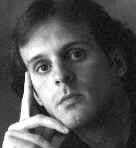 Michael Gatonska (b. 1967) studied composition with Krzystof Penderecki, Marek Stachowski, and Zbigniew Bujarski at the Academy of Music in Kraków, having received two post-graduate research grants from the Kosciuszko Foundation for music composition studies in Poland. He also studied with Elias Tanenbaum at the Manhattan School of Music.
Michael Gatonska (b. 1967) studied composition with Krzystof Penderecki, Marek Stachowski, and Zbigniew Bujarski at the Academy of Music in Kraków, having received two post-graduate research grants from the Kosciuszko Foundation for music composition studies in Poland. He also studied with Elias Tanenbaum at the Manhattan School of Music.
Gatonska’s music has been performed by the Cabrillo Festival Orchestra, the Minnesota Orchestra, the American Composers Orchestra, the Hartford Symphony, the Pacific Symphony, the Civic Orchestra of Chicago, the Talea Ensemble, the New York Miniaturist Ensemble, string quartet DAFO, and at the Krakow International Composers Festival, the Mosaico Music Festival (Poland), the Teagu Festival of Contemporary Music (South Korea), the Festival Internacional de Musica Contemporanea (Bogota, Colombia), the CSN New Music Festival (Nevada), the New Britain Museum of American Art, and twice he has participated in the Minnesota Orchestra Reading Sessions & Composer Institute. His awards for composition include two ASCAP Morton Gould Young Composer Awards, an award in the 2005 Pacific Symphony American Composer Competition, selection for the 2005 American Composers Orchestra Underwood Readings, Honorable Mention in the Craig and Janet Swann Composition Competition 2005 for choral music, participation in two Minnesota Orchestra & Composer Institutes, and the Chicago Symphony First Hearing Award. He has received a Civitella Ranieri Fellowship, grants from Meet the Composer and the American Music Center, and a MacDowell Colony Fellowship.
[Source: www.cabrillomusic.org]
Koffler Staged In Warsaw
 A new stage production of Józef Koffler’s Matrimonio con variazioni was premiered by the Warsaw Chamber Opera on May 22, 2009. Although this composition was performed throughout Poland, Germany and Austria when it was written in1932, this is the first time it has been produced by the Warsaw Chamber Opera with a newly re-created score and libretto. The work is a hybrid of ballet, oratorio and opera and is one of the most original compositions amongst not only Koffler’s works but also Polish music of the first half of twentieth century.
A new stage production of Józef Koffler’s Matrimonio con variazioni was premiered by the Warsaw Chamber Opera on May 22, 2009. Although this composition was performed throughout Poland, Germany and Austria when it was written in1932, this is the first time it has been produced by the Warsaw Chamber Opera with a newly re-created score and libretto. The work is a hybrid of ballet, oratorio and opera and is one of the most original compositions amongst not only Koffler’s works but also Polish music of the first half of twentieth century.
Józef Koffler (1896-1944) was first Polish composer to use the technique of serialism, and he was also a pioneer of neoclassicism and folklorism in Polish music. Next to Karol Szymanowski, he is considered one of the most important Polish composers of the early twentieth century. His music was largely forgotten, however, after he and his entire family perished in the Holocaust.
Matrimonio con variazioni, originally called Alles durch M.O.W., is the only stage work in Koffler’s small but important oeuvre, which also includes four symphonies, a piano concerto, numerous chamber works, songs, and solo piano compositions. For many years this piece was considered lost, until researcher and Koffler biographer Maciej Gołąb discovered it in the archives of Berlin’s Akademie der Kuenste in1993. In his book Józef Koffler: Compositional Style and Source Documents (PMHS Vol. 8), Gołąb describes the work thus: “This ‘chronicle of the day’ is a specific description of society, where semantically realistic elements mix with the post-expressionist drama of a human being imprisoned by modern industrial society.”
Since the only existing form of the work was a piano-vocal reduction with a German libretto, it took considerable work to re-create the original. Stefan Sutkowski, Director of the Warsaw Chamber Opera, describes how some of the work was done:
In order that the work might appear on stage, we had to restore the original text or write a new one – in Polish, of course – and also produce a suitable instrumentation. After much discussion with Edward Pałłasz, who received the work from Professor Gołąb, we came to the conclusion that it should be an instrumentation which resulted from certain indications contained in the reduction and above all conforming to features of musical works from the end of the 1920s written for theatres in Western Europe by composers close to Koffler. A group of single string instruments, coloured with wind instruments, piano, harmonium, percussion, guitar and banjo – something along those lines. That’s what we opted for, and a few months later Edward Pałłasz presented a complete score, from which we produced the orchestral material.
Poet and theater artist, Joanna Kulmowa, reconstructed the libretto and translated it into Polish. The score and libretto now encompass the original ensemble of one actor, two voice soloists (soprano and baritone), a small 4-part choir, corps de ballet and chamber orchestra.
The staging was directed and choreographed by Roman Angel and conducted by Przemysław Fiugajski, with stage design by Marlen Skoneczko.
[Sources: Warsaw Chamber Opera press release, muzyka.onet.pl, Kulmowa bio]
New Manru In Bytom
 The premiere of a new production of Manru—the only opera ever composed by Ignacy Jan Paderewski—took place at the Silesian Opera in Bytom on May 30 and 31. The staging was directed by Laco Adamik, who says this about the work:
The premiere of a new production of Manru—the only opera ever composed by Ignacy Jan Paderewski—took place at the Silesian Opera in Bytom on May 30 and 31. The staging was directed by Laco Adamik, who says this about the work:
“It is a wonderful opera, very beautiful and very noble. It is a pity that Paderewski wrote only one [opera]…. It shows two worlds, two cultures, the coexistence of which is not possible. Such worlds, which can’t live together, are still aplenty today.”
The libretto of the opera is based on Chata za wsią [A Hut Outside the Village], a novel by Józef Ignacy Kraszewski, adapted into a libretto by Alfred Nossig.
The Silesian Opera premiere is connected to a celebration of the 90th anniversary of Poland’s independence and signing of the Versailles Treaty by Paderewski. The performances were accompanied by the exposition in the foyer of the hall, entitled “Ignacy Jan Paderewski – Artist and Politician.”
[Source: culture.pl]
New Lachert Composition
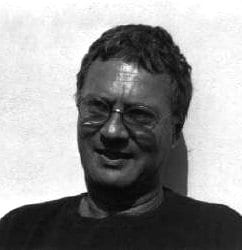 Concerto Aquilano is the just finished, latest major work of Piotr Lachert—Polish composer and winner of the Paderewski competition in Bydgoszcz in 1961. This concerto for piano and orchestra (22’) is dedicated to the victims of April 6th 2009 earthquake in Abruzzo, Italy.
Concerto Aquilano is the just finished, latest major work of Piotr Lachert—Polish composer and winner of the Paderewski competition in Bydgoszcz in 1961. This concerto for piano and orchestra (22’) is dedicated to the victims of April 6th 2009 earthquake in Abruzzo, Italy.
Grunwald Composition Competition
2010 marks the 600th anniversary of the legendary Battle of Grunwald. The Royal Wawel Castle has plans to celebrate the date with a very special event and, for that reason, has announced a competition to choose a “festive music” composition to accompany the celebrations. The prize for the winning composition – 50.000 PLN (ca. $15.000). As part of the celebrations there will be exhibitions, a comic book competition, research panels and National Composition Competition “Wawel: musica festiva”.
The subject is a composition (10-15 minutes long) for a symphonic orchestra (electronic elements are allowed) which fits the idea of musica festiva, or festive music. The competition is intended to prevent the controversy that was caused by the commission and performance of Piotr Rubik’s cantata Zakochani w Krakowie during the 750th anniversary of Kraków.
The competition is open to Polish composers of any age. The jury consists of:
- Henryk Mikołaj Górecki – chairman
- Zbigniew Bujarski
- Krzysztof Droba
- Eugeniusz Knapik
- Jerzy Kornowicz
- Stanisław Krawczyński
- Artistic Director: Małgorzata Janicka-Słysz
The deadline to send in entries is April 15, 2010. The jury will choose three compositions to be performed during the gala concert in the Arcade Courtyard of Wawel Castle on July 15, 2010. The program of the concert will also feature Górecki’s 2nd Symphony “Kopernik.” The concert will be performed by young artists conducted by Stanisław Krawczyński. It will be recorded for a DVD release as well.
Please visit www.wawel.krakow.pl for more information.
[Source: muzyka.onet.pl]
Youth Composition Competition
The 1st edition of the Janina Garścia Competition for the Young Composers “Mijusic” is now for open for entries. The competition is open to all students of secondary and high school music schools with no age limit. The subject of the competition is a composition for an instrument of choice or voice up to five performers, a small string orchestra, or a composition using modern electronic techniques (excluding visual effects). There are no style guidelines but unconventional and exploratory works are preferred.
Composers have until September 4, 2009 to submit their compositions. Every composer may send up to three entries. The works cannot be previously published or awarded in other competitions. The compositions must be under 8 minutes of duration.
The awards in the competition will be given in three categories: I – primary school students, II – junior high school students, and III – high school students. Prizes will include: performance of the winning works, publication of the composition, a CD recording of the compositions, broadcast on national RMF Classical radio, among others. All laureates will also have the chance to attend composition workshops by renowned composers. The results will be announced on October 23, 2009 on the szkolymuzyczne.pl website.
The competition is organized by Multimedia Music Laboratory MIJUMA in cooperation with the Primary Music School in Kraków.
[Source: muzyka.onet.pl]
Mizerska—Rising Cello Star
 Under a section entitled “Rising Star,” young Polish cellist Evva Mizerska was recognized in the June 2009 issue of The Strad magazine. Mizerska’s career has taken off with her 2007 project, “Polish Contemporary Music for Cello” (more about the project in the May 2007 Newsletter and at the Polish Cultural Inst. UK), and with her recent premiere recording of Krzysztof Meyer’s music for piano and cello on Toccata Records (see the Discographysection below for details). In his article, Tim Homfray discusses the highs and lows of her progress:
Under a section entitled “Rising Star,” young Polish cellist Evva Mizerska was recognized in the June 2009 issue of The Strad magazine. Mizerska’s career has taken off with her 2007 project, “Polish Contemporary Music for Cello” (more about the project in the May 2007 Newsletter and at the Polish Cultural Inst. UK), and with her recent premiere recording of Krzysztof Meyer’s music for piano and cello on Toccata Records (see the Discographysection below for details). In his article, Tim Homfray discusses the highs and lows of her progress:
All this [success] has come after rather a late start. She took up piano at eleven, and went to a music school in Warsaw. But Poland was still under communist rule: ‘Music school was free of charge,’ she says, ‘but you had to follow their rules. They decided I was too old to play the piano as my main instrument, and said I should choose between the flute and the cello.’ She was then 13, but quickly decided the cello would be her career. [See the entire article here]
Mizerska went on to graduate with distinction from the Chopin Academy in Warsaw, win the first prize at Leoś Janáček International Cello Competition in Brno, and pursue postgraduate studies at the Trinity College of Music in London. She remains based in the UK, and has future plans for recordings of both British and Polish works. To learn more about this up-and-coming star, visit her website: www.evvamizerska-cellist.co.uk.
Anderszewski & Friends
This month, pianist Piotr Anderszewski and the Arthur Rubinstein Philharmonic Orchestra in Łódz will present a series of piano recitals by various international artists. Called the “Piotr Anderszewski and his Friends” Festival, it will include performances by Maciej Grzybowski from Poland (June 17), Claudio Martinez Mehner from Spain (June 18), Balázs Szokolay from Hungary (June 19), Konstantin Lifschitz from Russia (June 21) and Francesco Libetta from Italy (June 22). Piotr Anderszewski will perform on June 20.
For more information, visit the Philharmonic website and click on “piano recitals.”
[Sources: Łódz Philharmonic, Polskie Radio]
Polish Radio Orchestra News
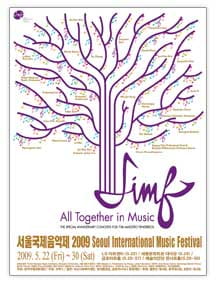 On May 29 and 30, the Polish Radio Orchestra performed at the Seoul International Music Festival 2009. The theme of this year’s festival was “All Together in Music.”
On May 29 and 30, the Polish Radio Orchestra performed at the Seoul International Music Festival 2009. The theme of this year’s festival was “All Together in Music.”
On May 29 during a program entitled “For Heroes,” the ensemble performed the Asian premiere of Sinfonia da requiem by Jeajoon Ryu, the artistic director of the festival who graduated from the Kraków Academy of Music, and Beethoven’s Piano Concerto No.4 in G Major, Op.58. [The world premiere of Sinfonia da requiem took place at the 12th Beethoven Festival in Warsaw.] Soloists were soprano Inhye Kim and pianist Julius Jeongwon Kim, conducted by Łukasz Borowicz, the Artistic Director of the Polish Radio Orchestra. The performance also promoted the CD recording of this work by the Polish Radio Orchestra at the Polish Radio Witold Lutosławski Studio with Polish Radio Choir from Kraków.
On May 30, Polish Radio Orchestra performed the final concert of the festival, entitled “Living Legend,” under the baton of Krzysztof Penderecki. Other performers were: So-Ock Kim / Violin, Inhye Kim/ Soprano, A-kyeong Lee / M. Soprano, Myoungwon Han / Baritone, the Goyang Civic Professional Choir, and the Bucheon Philharmonic Orchestra Chorus. The program of the concert was Szymanowski’s 1st Violin Concerto and Penderecki’s 8th Symphony.
Read a message from Elżbieta Penderecka, General Director of the Ludwig van Beethoven Easter Festival in Poland and wife of Krzysztof Penderecki, to the Seoul International Music Festival.
[Sources: culture.pl, www.esimf.com]
 The Polish Radio Orchestra will end their season back in the Witold Lutosławski Studio (pictured at right) for their End of the Season Gala on June 14. They will perform an all-Andrzej Panufnik program, consisting of his Hommage à Chopin, Sinfonia concertante for flute, harp and orchestra, Kołysanka, and Sinfonia rustica. Performers will be Anna Sikorzak-Olek, harp, Łukasz Długosz, flute, and Łukasz Borowicz, conductor.
The Polish Radio Orchestra will end their season back in the Witold Lutosławski Studio (pictured at right) for their End of the Season Gala on June 14. They will perform an all-Andrzej Panufnik program, consisting of his Hommage à Chopin, Sinfonia concertante for flute, harp and orchestra, Kołysanka, and Sinfonia rustica. Performers will be Anna Sikorzak-Olek, harp, Łukasz Długosz, flute, and Łukasz Borowicz, conductor.
Silesian Philharmonic News
 The Silesian Philharmonic in Katowice has joined the Orchestra Network of Europe (ONE), the first such E.U.-sanctioned network. The goal of the project is to exchange musicians, perform together, and promote the culture of individual countries, among others.
The Silesian Philharmonic in Katowice has joined the Orchestra Network of Europe (ONE), the first such E.U.-sanctioned network. The goal of the project is to exchange musicians, perform together, and promote the culture of individual countries, among others.
The Orchestra Network for Europe was started in 2003 and is partially funded by the European Union. This concept is unique in Europe, according to Rose Bardonnet-Lowry, a coordinator of the network from France’s Orchestre de Picardie, who gave this description of the Network’s mission:
We want the Europe to become a smaller, friendlier place, through this project. It makes possible for musicians to share different cultures, perform works by composers from different countries and take part in large scale projects. This requires good partnership, because the quality of the network depends on the quality of its members.
New partners are recommended by existing members. As part of the project, musicians of individual orchestras perform short tenures in the other ensembles taking part in the network. “It is a big challenge for them, it requires a change of mindset and raising the artistic level,” said Bardonnet-Lowry.
“We are happy that the cooperation was possible. It is a great chance for us to present Polish and Silesian music abroad in more ways,” said Grażyna Szymborska, director of the Silesian Philharmonic.
On September 4, 2009, the combined forces of the Silesian Philharmonic Orchestra and Choir, the Orchestre de Picardie, and the Boys Choir of the Jena Philharmonic (Germany) will join with international soloists to perform Benjamin Britten’s War Requiem in Katowice. In May 2010 Silesian Philharmonic is planning a tour of France.
The network is co-funded by European Union with a two year grant and each member of the network pays a membership fee. The network currently consists of orchestras from France, Poland, Germany, Slovenia and Slovakia. In previous years members included Kraków Philharmonic, Espoo Orchestra (Finland) and an orchestra from Ryga.
[Source: rmfclassic.pl]
New Website For Mujirushi
 Formed in Edmonton, Alberta, Canada, the avant-garde multi-media performers Ensemble Mujirushi was founded to present new graphic, visual, conceptual, verbal, intuitive and open scores by the Canadian and international Avant-garde and Experimental composers, as well as experimental poetry. The group, which began as a quintet, was first conceptualized by the composer, writer and pianist Piotr Grella-Mozejko. Their public performances, notably during the Explorations Concert Series and New Music in New Places project, usually held at the Stanley Milner Library Theatre, have already become highly discussed and invariably receive a slew of enthusiastic reviews and comments from the critics and audiences alike. The ensemble specialises in the performance of contemporary avant-garde and experimental scores and poetry, which more often than not resemble abstract paintings. Because they were “nameless,” the group adopted the Japanese moniker Mujirushi (literally “no name”).
Formed in Edmonton, Alberta, Canada, the avant-garde multi-media performers Ensemble Mujirushi was founded to present new graphic, visual, conceptual, verbal, intuitive and open scores by the Canadian and international Avant-garde and Experimental composers, as well as experimental poetry. The group, which began as a quintet, was first conceptualized by the composer, writer and pianist Piotr Grella-Mozejko. Their public performances, notably during the Explorations Concert Series and New Music in New Places project, usually held at the Stanley Milner Library Theatre, have already become highly discussed and invariably receive a slew of enthusiastic reviews and comments from the critics and audiences alike. The ensemble specialises in the performance of contemporary avant-garde and experimental scores and poetry, which more often than not resemble abstract paintings. Because they were “nameless,” the group adopted the Japanese moniker Mujirushi (literally “no name”).
The six original members of the ensemble are all local musicians-performers. Composer and educator Piotr Grella-Możejko, who initially conceived of the group and became its wellspring, is pianist and keyboardist. The well-known performance artist Gerry Morita, the Artistic Director of the Mile Zero Dance Company, provides visual dance interpretations of the music. The brilliant mezzo-soprano and actress Michelle Milenkovic adds her interpretive skills to broaden the range of the group’s repertoire. The distinguished Canadian-Polish photographer and artist, Felix Plawski, offers visual complementation for the music. Musician, educator and writer Jerry Ozipko performs on acoustic and electric violins, while composer, performer and educator Charles Stolte rounds out the sextet on saxophones. [from the website: mujirushi.eccsociety.com]
Awards
Kilar Honored By Vatican
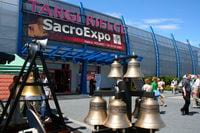 On June 8th, Polish composer Wojciech Kilar will receive his “Per Artem ad Deum” [Through Art Toward God] medal from the Papal Board for the Culture, an honor that was announced in April. He will be given the medal in Kielce during the International “SacroExpo” Tradeshow. According to Tradeshow representative Beata Wentura-Dudek: “The artist was highly moved by the award. He said that the medal established by Pope John Paul II will be the most valued of his awards.”
On June 8th, Polish composer Wojciech Kilar will receive his “Per Artem ad Deum” [Through Art Toward God] medal from the Papal Board for the Culture, an honor that was announced in April. He will be given the medal in Kielce during the International “SacroExpo” Tradeshow. According to Tradeshow representative Beata Wentura-Dudek: “The artist was highly moved by the award. He said that the medal established by Pope John Paul II will be the most valued of his awards.”
The composer will receive the medal directly from arch-bishop Ginfranco Ravasi, who is the head of the Papal Board for the Culture and will be an honored guest at the “SacroExpo.” During the award gala at the Kielce Art Center, the Świętokrzyskie Philharmonic will perform Kilar’s Krzesany and Kościelec 1909 with conductor Jacek Rogala.
The “Per Artem ad Deum” medal has been awarded for five years now. Last year it was given to Leszek Mądzik – visual artist from the Catholic University in Lublin. Previous recipients include Stanisław Słonina – sculptor, prof. Dobrosław Bagiński – sculptor and designer; and the stained glass workshop “Furdyna” in Kraków.
[Source: rmfclassic.pl]
Kiepura International Tenor Contest
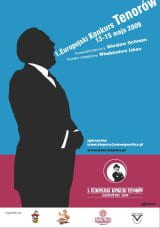 Arnold Rutkowski has won the 1st edition of the European Jan Kiepura Tenor Voice Competition in Sosnowiec, Poland. The second place was given to Kirilianit Cortez-Galvez from Columbia, and the third to Adam Sobierajski.
Arnold Rutkowski has won the 1st edition of the European Jan Kiepura Tenor Voice Competition in Sosnowiec, Poland. The second place was given to Kirilianit Cortez-Galvez from Columbia, and the third to Adam Sobierajski.
The jury, comprised of Zdzisława Donat, Jadwiga Romańska-Gabryś and Bogdan Paprocki, was led by Wiesław Ochman, who also gave his own special award to Witalij Wydra from Ukraine.
This first edition of the competition attracted 18 young singers from several countries. The competition was open to tenors from around the world who were students or graduates of higher education music schools. The age limit for the participants was 38. The competition was organized in Sosnowiec as it is the hometown of Jan Kiepura, one of the greatest Polish singers of all time.
[Source: rmfclassic.pl]
Kiepura Music Theater Awards
The winners of this year’s Jan Kiepura Music Theater Award of this past season are:
- Best Show: the Kraków Opera production of Diabły z Loudun [Devils from Loudun] by Krzysztof Penderecki
- Best Director: Laco Adamik
- Best Singers (male and female): Piotr Friebe and Aleksandra Kubas
- Best Debut (male and female): Krystian Adam Krzeszowiak and Liza Wesołowska
- Best Condutor: Tadeusz Serafin
- Lifetime Achievement Award: Bogdan Paprocki, tenor
The 12 award recipients (including others in stage and costume design) in this year’s edition were presented during a press conference in Sosnowiec. The awards ceremony took place on May 16 during a gala in Hala Zagórze in Sosnowiec.
Diabły z Loudun was prepared for the opening of the new building of Kraków Opera by stage director Laco Adamik. Piotr Friebe is a singer with the Grand Theater National Opera in Warsaw and Aleksandra Kubas is from the Wrocław Opera. Tenor Krystian Adam Krzeszowiak is touring around Europe and Liza Wesołowska sings with the Mazovian Jan Kiepura Music Theater and Operetta. Tadeusz Serafin is the director of Silesian Opera in Bytom—see above for more information on his new staging of Paderewski’s Manru with Laco Adamik as director.
[Sources: muzyka.onet.pl, Silesian Opera]
Polish Singer Honored
 Soprano Aleksandra Chacińska has won the second prize at the International Vocal Competition in Barcelona, co-organized by Gran Teatre del Liceu. This year the competition attracted 180 singers from around the world. Only 80 were invited to perform in Barcelona and only 12 musicians (1 bass, 2 tenors and 9 sopranos) were invited to the final round. Aleksandra Chacińska is the first Pole to ever perform in the final round of this competition.
Soprano Aleksandra Chacińska has won the second prize at the International Vocal Competition in Barcelona, co-organized by Gran Teatre del Liceu. This year the competition attracted 180 singers from around the world. Only 80 were invited to perform in Barcelona and only 12 musicians (1 bass, 2 tenors and 9 sopranos) were invited to the final round. Aleksandra Chacińska is the first Pole to ever perform in the final round of this competition.
This honor in Barcelona is not the first prize in the collection of this Polish singer. She has already made her mark at the Flavio Labo Competition in Piacenza, the Riccardo Znadonai Competition in Riva del Garda, and the Ottavio Ziino competition in Rome. In 2006 she won the first prize and a special prize at the 11th International Vocal Competition in Bilbao.
Aleksandra Chacińska is a graduate of the Bacewicz Music Academy in Łódź. She has performed with Grand Theater – National Opera in Warsaw, Grand Theater in Poznań, Kraków Opera, and Łódź Music Theater in Poland, as well as theaters in Kassel, Gelsenkirchen, and Bilefeld in Germany.
[Sources: muzyka.onet.pl, rmfclassic.pl]
Performances
Wit Opens Prague Spring
 Antoni Wit, Music Director of the Warsaw National Philharmonic, conducted the Prague Radio Symphony Orchestra (pictured above) in two concerts inaugurating the 64th Annual Prague Spring International Music Festival on May 12 and 13. He was serving as the last-minute replacement for Estonian conductor Neeme Jarvi, who had suddenly taken ill. Per Festival tradition, the program of the concert was Bedřich Smetana’s cycle of symphonic poems, Má vlast [My Country].
Antoni Wit, Music Director of the Warsaw National Philharmonic, conducted the Prague Radio Symphony Orchestra (pictured above) in two concerts inaugurating the 64th Annual Prague Spring International Music Festival on May 12 and 13. He was serving as the last-minute replacement for Estonian conductor Neeme Jarvi, who had suddenly taken ill. Per Festival tradition, the program of the concert was Bedřich Smetana’s cycle of symphonic poems, Má vlast [My Country].
[Sources: www.polskieradio.pl, www.prague-spring.net]
Polish Pianists Fêted In Paris

On May 13, Polish-Hungarian pianist Piotr Anderszewski performed a recital at the Champ-Elysees Theatre in Paris, and according to Polish Radio, he received “an enthusiastic reception”:
The programme included pieces featured on his latest CD ‘Anderszewski at Carnegie Hall’ recorded live six months ago [see details in Discography]: a selection of Chopin’s mazurkas and works by Bach, Beethoven and Janacek. There were two encores of Bach and Bartok, followed by the signing of the CD for crowds of fans. Anderszewski told the Polish Press Agency that he will give a concert in Lodz next month.
 Then, on May 14 also at the Champs-Elysees Theatre, Polish pianist Rafał Blechacz was the soloist for a French National Orchestra concert under Fabien Gabel. According to a Polish Radioreport entitled “Blechacz takes Paris audience by storm”:
Then, on May 14 also at the Champs-Elysees Theatre, Polish pianist Rafał Blechacz was the soloist for a French National Orchestra concert under Fabien Gabel. According to a Polish Radioreport entitled “Blechacz takes Paris audience by storm”:
[Blechacz] played the Second Piano Concerto by Saint-Saens and, following a long ovation from a packed hall, two pieces by Chopin as encores. Less than two months ago Blechacz gave a highly successful recital in Paris.
Final Gala Of Polish Year In Israel
 The final gala concert of the Polish Year in Israel took place on May 24 in the Sherover Theatre of Henry Crown Hall in Jerusalem. The special concert featured a performance of Henryk Mikołaj Górecki’s 3rd Symphony “Symphony of Sorrowful Songs” and Frederic Chopin’s Piano Concerto in E Minor op. 11 and Don Giovani variations in B flat Major op. 2. The concert was performed by the Israeli Philharmonic conducted by Michał Dworzyński. Soloists for the evening were Polish soprano Iwona Hossa, Polish pianist Jacek Kortus (concerto) and Israeli pianist Dorel Golan (variations). Poland’s First Lady Mrs. Maria Kaczyńska was the evening’s special guest.
The final gala concert of the Polish Year in Israel took place on May 24 in the Sherover Theatre of Henry Crown Hall in Jerusalem. The special concert featured a performance of Henryk Mikołaj Górecki’s 3rd Symphony “Symphony of Sorrowful Songs” and Frederic Chopin’s Piano Concerto in E Minor op. 11 and Don Giovani variations in B flat Major op. 2. The concert was performed by the Israeli Philharmonic conducted by Michał Dworzyński. Soloists for the evening were Polish soprano Iwona Hossa, Polish pianist Jacek Kortus (concerto) and Israeli pianist Dorel Golan (variations). Poland’s First Lady Mrs. Maria Kaczyńska was the evening’s special guest.
The Polish Year in Israel 2008/2009 is a joint venture launched by the Polish Ministry of Culture and National Heritage and the Ministry of Foreign Affairs. The main objective of the Polish Year in Israel is to bring together Polish and Israeli societies by strengthening cultural and economic contacts as well as contacts on a tourist and scientific level. Moreover, the venture is aimed at starting long-term cooperation between the institutions of both countries.
[Source: culture.pl, Adam Mickiewicz Inst., Event press release]
Discography
Meyer Premiere On Toccata
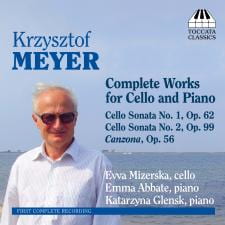 Krzysztof Meyer – Complete Works for Cello and Piano
Krzysztof Meyer – Complete Works for Cello and Piano
Cello Sonata No. 1, Op. 62; Cello Sonata No. 2, Op. 99; and Canzona, Op. 56
Evva Mizerska, cello; Emma Abbate, piano; and Katarzyna Glensk, piano
Toccata Records TOCC0098
This disc is the first complete recording of works for piano and cello by Krzysztof Meyer, including the World Premiere recording of his Cello Sonata No. 2, Op. 99. Although the official release date is July 6, 2009, it is already available for purchase and download at Toccata Records.
According to the Toccata Records website:
Krzysztof Meyer, born in Kraków in 1943 and a student of Penderecki, Lutosławski and Nadia Boulanger, is one of the leading Polish composers of the day. His music marries a powerful sense of drama with a long-breathed lyricism in a largely tonal framework, placing him downstream from Shostakovich, who was a friend and supporter of the young composer. Of his two cello sonatas (1983 and 2004) and Canzona (1981), Meyer writes, ‘I wanted the melody to be predominant – not a post-Romantic cantilena but absolutely contemporary. And the cello, like no other instrument, is perfect for that’.
Tim Homfray of The Strad says of this disc that, “[cellist Evva Mizerska] shows a great expressive range and impressive authority” (see article here).
Penderecki Premiere On DUX
 Krzysztof Penderecki – Complete Choral Works
Krzysztof Penderecki – Complete Choral Works
Penderecki (b. 1933): Choral works for female, male, and mixed choirs a cappella, including the World Premiere recording of Kaczka pstra (2008) and “Aria” from Three Pieces in Old Style (1963)
Polish Chamber Choir Schola Cantorum Gedanensis, Jan Łukaszewski – cond.
Series: Penderecki Special Edition
DUX 0694
“Looking at Krzysztof Penderecki’s choral output, one cannot help noticing that in comparison with other, highly diverse forms of his artistic utterance, it constitutes the most homogenous whole. While it is possible to point to various stylistic references that inspired many strands of his musical itinerary, his works for a cappella choir, spanning as they do almost five decades, appear to be very coherent in terms of their expressive features and also stylistically homogeneous. The reasons for this state of affairs may be found both in the sound matter itself and the specific sound possibilities of an ensemble of human voices, to which Penderecki deliberately assigned an idiomatic value, and in the ‘external’ inclinations of his choral compositions which are something far more than an ideological inspiration. The organic homogeneity of these works stems first and foremost from Penderecki’s mature compositional craft which is manifested not only in the masterful command of many stylistic practices from previous periods (evident also in his pieces in other genres) but above all in the expressively perfect synthesis of numerous musical styles and trends. All of Penderecki’s a cappella choral compositions on this CD go a long way to show that reconciling broadly-understood traditions with openness to contemporary avant-garde trends is possible and can bring aesthetically impressive results.”
From the liner notes by Tomasz Jeż
translated by Michał Kubicki
[Reprinted with permission from DUX Records]
More from DUX
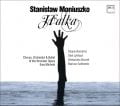 Moniuszko – Halka
Moniuszko – Halka
Stanisław Moniuszko: Halka opera
Tatiana Borodina – soprano, Aleksandra Buczek – soprano, Mariusz Godlewski – baritone, Andrzej Kalinin – tenor, Zbigniew Kryczka – bass-baritone, Oleh Lykhach – tenor, Rafał Majzner – tenor, Jacek Ryś – tenor, Janusz Zawadzki – tenor, Radosław Żukowski – bass; Wrocław Opera and Choir; Ewa Michnik – conductor
DUX0538-0538
 Andrzej Nikodemowicz – works for violin in piano
Andrzej Nikodemowicz – works for violin in piano
Andrzej Nikodemowicz: Romance; Kołysanka [Lullaby]; Notturno; Poeme I; Poeme II; Sonata
Katarzyna Duda – violin; Agnieszka Schulz-Brzyska – piano
DUX0705
Górecki On Blu-Ray
 The first-ever release of Henryk Mikołaj Górecki’s 3rd Symphony “Symphony of Sorrowful Songs” recorded on Blu-Ray disc was presented by the National Culture Center and Lipinski Royal Fidelity Company at the F. Chopin Music University in Warsaw on May 28. The Blu-Ray format allows the best clarity and fidelity of picture and sound available today.
The first-ever release of Henryk Mikołaj Górecki’s 3rd Symphony “Symphony of Sorrowful Songs” recorded on Blu-Ray disc was presented by the National Culture Center and Lipinski Royal Fidelity Company at the F. Chopin Music University in Warsaw on May 28. The Blu-Ray format allows the best clarity and fidelity of picture and sound available today.
The disc is being released as a part of the celebrations of the 70th anniversary of WWII and the 20th anniversary of the fall of communism in Central Europe, which carry the theme “Zaczęło się w Polsce” [It started in Poland].
The publication contains:
- a Blu-Ray disc with a Hi-Def recording of Górecki’s 3rd Symphony. The recording was made in Zakopane by the Polish Radio National Symphony Orchestra (NOSPR) and soprano Zofia Kilanowicz in Zakopane on 14 December 2003
- a 48-page hardcover booklet with essays about the Symphony by Wiesław Stróżewski and Andrzej Nowak, as well as biographies of Górecki, Kilanowicz and NOSPR
- a commemorative hardcover with a logo of Zaczęło się w Polsce celebrations and an illustration by Rafał Olbiński
- a 22-page pamphlet with essays by Paweł Lisicki, Jarosław Kurski, Michał Karnowski, and Paweł Fąfara discussing the importance of the events that occurred during the years 1939-1989 for the history of modern Poland. [read these essays online here]
More information about this commemorative disc and other celebrations is available on the anniversary website, 3989.pl.
[Sources: muzyka.onet.pl, nck.pl]
Górecki On Telarc
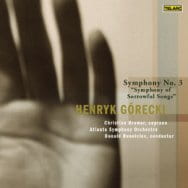 Gorecki: Symphony No. 3, “Symphony of Sorrowful Songs”
Gorecki: Symphony No. 3, “Symphony of Sorrowful Songs”
I. Lento: Sostenuto tranquillo ma cantabile; II. Lento e largo: Tranquillissimo cantabile; III. Lento: Cantabile, semplice
Christine Brewer, soprano, with the Atlanta Symphony Orchestra, Donald Runnicles, conductor
Telarc 80699
In a review for the Atlanta Journal-Constitution, Pierre Ruhe discussed not only a recent performance of the Atlanta Symphony Orchestra, but also their recent recording, which features Polish composer H. M. Górecki’s most famous symphony:
Henryk Gorecki’s “Symphony of Sorrowful Songs” is a modern classic with an incredible back story. It’s arguably the finest disc Runnicles has cut during his nine-year tenure as ASO principal guest conductor and should fuel the Scottish-born maestro’s reputation as a comprehensive interpreter of the highest international rank….
London’s BBC Music Magazine gave the ASO’s new Gorecki recording a superlative five stars.
“[Christine] Brewer’s rich voice and subtle inflections are sufficiently personal to distinguish her equally fine interpretation from Upshaw’s,” the magazine wrote, “and at times there is an edge, an almost gritty quality, that will appeal to anyone who found the earlier recording to be perhaps just a little too celestial.”
The Telarc website also lends some perspective from conductor Donald Runnicles, as well as more background information on this piece, which has reached cult classic status:
“Any new recording with the Atlanta Symphony is quite special to me,” said Atlanta Symphony Orchestra Principal Guest Conductor Donald Runnicles. “Working also with my dear friend Christine Brewer is one of my greatest joys, particularly on such a profoundly spiritual piece as the Górecki. Christine and I treasure a long history of collaboration, and we look forward to sharing this new adventure with audiences worldwide.”
Written in 1976, the symphony, which is also known as the “Symphony of Sorrowful Songs,” is a setting of three Polish texts with the theme of separation through war: The first is a 15th century Polish lament in which Mary speaks to her son Jesus as he is dying; the second is a message written on the wall of a Gestapo cell by a teenage girl during the Second World War; and the third is a folk song in which a mother grieves for her son killed in the Silesian uprisings.
The symphony marked a change in compositional style for Górecki, who was previously identified as a member of the modernist wing of European music that was prone to compositions constructed of clashing sound masses and serially ordered elements. The symphony’s simplicity, chant-like melodic nature and largely consonant harmonies took many listeners and critics by surprise. The symphony also became an unexpected crossover hit record when a 1992 recording by soprano Dawn Upshaw and David Zinman and the London Sinfonietta was embraced by record buyers. The recording sold more than a million copies and climbed to the top of the classical music charts in both the U.S. and the U.K. It also reached number six on the mainstream U.K. album chart.
Anderszewski Live At Carnegie Hall
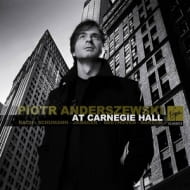 Piotr Anderszewski – Live at Carnegie Hall
Piotr Anderszewski – Live at Carnegie Hall
Piotr Anderszewski, pianist
Bach: Partita No. 2; Schumann: Carnival Scenes from Vienna; Janacek: In the mists; Beethoven: Piano Sonata No. 3; and Bartok: Three Hungarian Folksongs from the Csik Distrist
Virgin Classics 5099926729121
“It can be hard not to wax hyperbolic when confronted with the pianist Piotr Anderszewski’s sensitive touch and potent imagination.” New York Times
Since his first release for Virgin Classics, Beethoven’s Diabelli Variations in 2000, Polish pianist Piotr Anderszewski’s has produced a catalogue which ranges from Bach and Mozart, through more Beethoven to Chopin, Szymanowski and Webern, and which includes several prizewinning recordings.
Both intellectual and inspirational, Anderszewski has said of musical interpretation: “One can speculate endlessly about the right ingredients, the perfect combination but the essential question remains unanswerable, lying far beyond the limits of the cleverest and most refined argument. And yet one goes on searching and, while realising that the search is about everything, the essence may yet reveal itself in the most unexpected way.”
This new release captures live performances by Anderszewski at a very recent recital – December 2008 – in New York’s legendary Carnegie Hall. The critic of the New York Times made clear that this was an exceptional musical experience. “After a performance so intense and draining, the notion of encores almost seemed superfluous. But Bartók’s Three Hungarian Folksongs from the Csik District had a welcome earthiness”
Anderszewski repeated the programme in Chicago shortly afterwards, and the response of the Chicago Sun Times was at a similar level of enthusiasm:
There is something deeply comforting about the kind of perfection that Polish-Hungarian pianist Piotr Anderszewski brought to his program of Bach, Janáèek and Beethoven … Perfection is a relative term when it comes to art, of course. There are myriad but equally valid ways to play a Bach partita or Beethoven sonata … Different artists plumb different facets in a piece of music, and listeners can only benefit from hearing what each one has managed to unearth…. But during the two hours or so that they are onstage, artists like Anderszewski manage to create a universe that seems utterly complete unto itself. There is a sense of inevitability in their performance, a feeling that the true essence of a composer’s intentions has been discovered. Especially when our daily lives are battered by forces beyond our control, it is reassuring to spend an afternoon in a world of such richly calibrated balance.
[from the Virgin Classics website]
[Source: Virgin Classics, Polskie Radio]
Szymanowski On Naxos Review
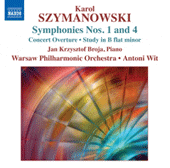 Szymanowski: Symphonies no. 1 & 4
Szymanowski: Symphonies no. 1 & 4
Karol Szymanowski: Concert Overture Op. 12; Symphony no. 1 in F Minor Op. 15; Symphony no. 4 Op. 60 “Symphonie Concertante”; Study in B flat Minor Op. 4 no. 3 (arr. G. Fitelberg)
Jan Krzysztof Broja – piano; Warsaw National Philharmonic, Antoni Wit – conductor
NAXOS 8.570722
Although his May 10 article in the Detroit Free Press is entitled “Emerson Quartet soars with passionate Janacek works,” Mark Stryker also spends several paragraphs discussing the recent Naxos release featuring Symphonies No. 1 & 4 of Szymanowski:
…Speaking of underrated 20th-Century composers, the Polish master Karol Szymanowski (1882-1937) wrote extraordinary music ripe with native folk melody folded into a late-romantic sound world. Conductor Antoni Wit and the Warsaw Philharmonic have been turning out a string of fantastic Szymanowski (shih-ma-NOFF-skee ) discs for Naxos, and the latest includes beautifully paced and sumptuous performances of the First and Fourth Symphonies (****).
The Fourth Symphony, which has such a prominent solo piano part that it’s practically a concerto, is bracingly unique. The music is full of folk-like melodies bathed in the composer’s magical and sophisticated harmonic world. Tactile textures capture the ear, and the open-hearted expression ensures that nobody misses the point….
New Jazz From Poland
 Levity
Levity
Levity: original compositions
Jacek Kita – piano; Piotr Domagalski – upright bass;
Jerzy Rogiewicz – drums
LACDABC
Levity is an exceptional jazz trio formed in 2005 by two composers and a bassist. This unusual cooperation has created highly personal and adventurous music. The group’s unlimited influences range from contemporary classical through avant-garde jazz to electronica. But, most of all it is clear that Levity loves simple songs and beautiful melodies.
[Source: ladoabc.com]
Polish Radio Re-Edition
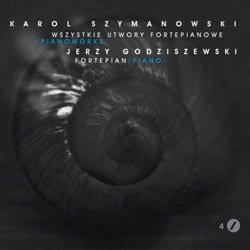 Jerzy Godziszewski – Szymanowski
Jerzy Godziszewski – Szymanowski
Karol Szymanowski: Complete solo piano works
Jerzy Godziszewski – piano
PRCD1261-64
This is a re-edition of an album that was originally released by Polish Radio in 1998, when it was awarded the Fryderyk award, the most important award of the Polish recording industry, and a monthly pick from the Polish audiophile magazine, Studio. The album contains all solo piano works written by Karol Szymanowski.
[Sources: polskieradio.pl, muzyka.onet.pl]
Chopin Bicentennial Honored In Hungary
 The complete bicentennial edition of the works of CHOPIN, Vol. 1-2: Mazurkas
The complete bicentennial edition of the works of CHOPIN, Vol. 1-2: Mazurkas
Op 6 – 4 Mazurkas (1830); Op 7 – 5 Mazurkas (1830/31); Op 17 – 4 Mazurkas (1832/33); Op 24 – 4 Mazurkas (1834/35); Op 30 – 4 Mazurkas (1836/37); Op 33 – 4 Mazurkas (1837/38); Op 41 – 4 Mazurkas (1838/39); Op 50 – 3 Mazurkas (1841/42); Op 56 – 3 Mazurkas (1843); Op 59 – 3 Mazurkas (1845); Op 63 – 3 Mazurkas (1846); Op 67 – 4 Mazurkas (OEuvre posthume); and Op 68 – 4 Mazurkas (OEuvre posthume)
Alex Szilasi, piano
Hungaroton Records HCD 32469-70 (2 discs)
This recording features Hungarian pianist Alex Szilasi on an authentic Pleyel concert grand piano. It is produced by Hungary’s original recording copmany, Hungaroton Records.
Festivals
Lutosławski Chain Festival
The 6th edition of the Witold Lutosławski Chain Festival takes place between June 3 and 7 in the Lutosławski Concert Studio of the Polish Radio in Warsaw. The festival is organized by the Witold Lutosławski Society in cooperation with Polish Radio Chanel 2.
Łańcuch, or Chain, is a musical form created by Witold Lutosławski, which he used in three compositions of the same name. Creation of constructions with overlapping links is one of the characteristics of Lutosławski’s style and this festival is such a chain of events: concerts, meetings, and other music related ventures for musicians from around Europe.
This year there will be five concerts by talented Polish and international performers. In addition to music by Lutosławski, there will be compositions by composers who were close to and valued by him. The festival will be inaugurated by the Lutosławski Piano Duo (Emilia Sitarz and Bartłomiej Wąsik). The evening’s program includes Variations on a theme by Paganini by Witold Lutosławski, Six epigraphes antiques by Claude Debussy, Mazurka elegiaca by Benjamin Britten and Makrokosmos IV by George Crumb.
For more information and a complete program of the festival, please visit the official website of the Lutosławski Society.
[Source: culture.pl]
XIX Int’l Sacred Music Festival
The main event of the 19th International Sacred Music Festival (May 31-June 5) will be the inaugural concert, commemorating the 200th anniversary of death of Joseph Haydn. The Holy Cross Basilica in Warsaw will host a concert of Haydn’s Creation oratorio, performed by the National Opera Orchestra and Mozart Knabenchor Wien conducted by Peter Lang. Marta Boberska, soprano and Andrzej Klimczak, bass will be the soloists for the evening.
In all there will be 9 solo, vocal and symphonic concerts by artists from Poland, Germany, Italy Austria and Russia. All the concerts take place in beautiful churches around Warsaw. During the festival, Director and organist Przemysław Kapituła will receive the “Silver Pipe” Award, established by Primate of Poland in recognition of development and promotion of sacred music in Poland.
The detailed program of the festival is available on the official website at www.kapitula.org.
[Source: culture.pl]
Chopin Recitals
Chopin Recitals in Royal Łazienki Park – 50th Anniversary Year
 The Chopin recitals at Łazienki Park in Warsaw have always attracted Chopin fans from around the world. Every concert has audiences of over 3,000 people, which during the course of a complete season yields approximately 120,000 attendants. The high artistic level of the recitalists is ensured by the Fryderyk Chopin International Society, the group responsible for booking artists for this prestigious series, and all concerts are watched over by the park’s enormous statue of the great composer himself.
The Chopin recitals at Łazienki Park in Warsaw have always attracted Chopin fans from around the world. Every concert has audiences of over 3,000 people, which during the course of a complete season yields approximately 120,000 attendants. The high artistic level of the recitalists is ensured by the Fryderyk Chopin International Society, the group responsible for booking artists for this prestigious series, and all concerts are watched over by the park’s enormous statue of the great composer himself.
The concert cycle starts in mid-May and lasts until the end of September. Concerts are held every Sunday at 12 and 4 pm. In June the concert calendar is as follows:
- June 7, 2009, 12:00 – Anna Maria Stańczyk
- June 7, 2009, 4:00 – Lidia Grychtołówna
- June 14, 2009, 12:00 – Andrzej Stefański
- June 14, 2009, 4:00 – Ewa Bukojemska
- June 21, 2009, 12:00 – Krystyna Man Li-Szczepańska (China)
- June 21, 2009, 4:00 – Joanna Marcinkowska
- June 28, 2009, 12:00 – Eugen Indjic (USA)
- June 28, 2009, 4:00 – Eri Iwamoto (Japan)
For more information, please visit tifc.chopin.pl .
[Source: culture.pl]
Chopin Recitals in Żelazowa Wola
 Starting at the beginning of May and ending in September, in the Żelazowa Wola Manor where Frederic Chopin was born, a cycle of piano recitals dedicated to music of the great composer is hosted. The concert series always attracts outstanding Polish and international pianists. Every Sunday there are two recitals at 12 and 3 pm.
Starting at the beginning of May and ending in September, in the Żelazowa Wola Manor where Frederic Chopin was born, a cycle of piano recitals dedicated to music of the great composer is hosted. The concert series always attracts outstanding Polish and international pianists. Every Sunday there are two recitals at 12 and 3 pm.
The June concert calendar includes the following performances:
- June 7, 2009, 12:00 – Joanna Ławrynowicz
- June 7, 2009, 3:00 – Iwona Klimaszewska
- June 14, 2009, 12:00 – Marek Drewnowski
- June 14, 2009, 3:00 – Maria Korecka
- June 21, 2009, 12:00 – Joanna Marcinkowska
- June 21, 2009, 3:00 – Joanna Trzeciak
- June 28, 2009, 12:00 – Filip Wojciechowski
- June 28, 2009, 3:00 – Piotr Paleczny
For more information, please visit The Fryderyk Chopin Institute.
[Source: culture.pl]
Festiwal Pieśni Europejskiej
 The 5th edition of the “Festival of European Songs” will be held from June 6 – 14 in the Łazienki Museum and Wilanów Museum in Warsaw. Each concert will celebrate the songs of a different country: Germany (June 6), England (June 7), Scotland (June 13), Austria (June 14), and Italy (June 14). This Festival will attract some of Poland and Europe’s greatest musicans: Małgorzata Ajdukiewicz – soprano, Witold Żołądkiewicz – baritone, Ewa Pelwecka – piano, Ryszard Cieśla – baritone, Maja Nosowska – piano, Paweł Bazan – baritone, Grzegorz Skrobiński – piano, Catherine King – mezzo-soprano, Elżbieta Mucha – piano, Urszula Kryger – mezzo-soprano, Krzysztof Szmyt – tenor, Łukasz Hajduczenia – baritone, Jan Stanienda – violin, Lidia Grzanka-Urbaniak – cello, Katarzyna Jankowska – piano, Jan Monowid – alt, Artur Janda – bass, Anton Birulya – chitarone, Justyna Rekść-Raubo – cello, and Lilianna Stawarz – harpsichord.
The 5th edition of the “Festival of European Songs” will be held from June 6 – 14 in the Łazienki Museum and Wilanów Museum in Warsaw. Each concert will celebrate the songs of a different country: Germany (June 6), England (June 7), Scotland (June 13), Austria (June 14), and Italy (June 14). This Festival will attract some of Poland and Europe’s greatest musicans: Małgorzata Ajdukiewicz – soprano, Witold Żołądkiewicz – baritone, Ewa Pelwecka – piano, Ryszard Cieśla – baritone, Maja Nosowska – piano, Paweł Bazan – baritone, Grzegorz Skrobiński – piano, Catherine King – mezzo-soprano, Elżbieta Mucha – piano, Urszula Kryger – mezzo-soprano, Krzysztof Szmyt – tenor, Łukasz Hajduczenia – baritone, Jan Stanienda – violin, Lidia Grzanka-Urbaniak – cello, Katarzyna Jankowska – piano, Jan Monowid – alt, Artur Janda – bass, Anton Birulya – chitarone, Justyna Rekść-Raubo – cello, and Lilianna Stawarz – harpsichord.
The Festival of European Songs is organized by the R. Traugutt Philharmonic, Krzysztof Kur – Director and Ryszard Cieśla – Artistic Director. For more information, please see: www.fit.waw.pl.
Anniversaries
Born This Month
- June 1, 1909 – Maria DZIEWULSKA, composer and theoretician (d. 2006)
- June 4, 1845 – Aleksander POLIŃSKI, music historian (d. 1916)
- June 4, 1784 – Adam CZARNOCKI, music ethnographer (d. 1825)
- June 5, 1865 – Felicjan SZOPSKI, composer and music critic (d. 1939)
- June 6, 1929 – Bogusław SCHAEFFER, composer, writer
- June 12, 1897 – Aleksander TANSMAN, composer and pianist,
- June 16, 1923 – Henryk CZYŻ, conductor and composer
- June 17, 1930 – Romuald TWARDOWSKI, composer
- June 28, 1895 – Kazimierz SIKORSKI, composer and teacher
- June 28, 1904 – Włodzimierz POŹNIAK, musicologist
Died This Month
- June 1, 1869 – Jozef DULEBA, pianist and participant of January Uprising, died in a duel (b. 1843)
- June 3, 1904 – Daniel FILLEBORN, singer and performer of main parts in Moniuszko’s operas (b. 1841)
- June 4, 1872 – Stanislaw MONIUSZKO, Father of Polish National opera (b. 5 May 1819)
- June 5, 1964 – Henryk SZTOMPKA, pianist, Chopin specialist, teacher
- June 9, 1932 – Natalia JANOTHA, pianist and composer, student of Clara Wieck-Schumann, Royal Pianist in London, 400 opus numbers (b. 1856)
- June 10, 1953 – Grzegorz FITELBERG, conductor, composer, great promoter of new music, esp. Szymanowski (b. 1879)
- June 28, 1938 – Ludwik DRZEWIECKI, pianist and father of Zbigniew Drzewiecki
- June 29, 1945 – Kazimierz GARBUSINSKI, pianist, organist, composer
- June 30, 1957 – Michal SWIERZYNSKI, composer and choral conductor
